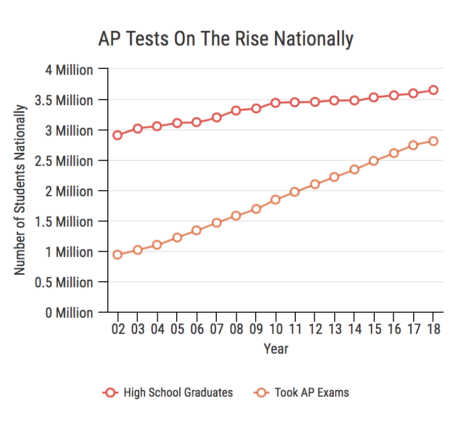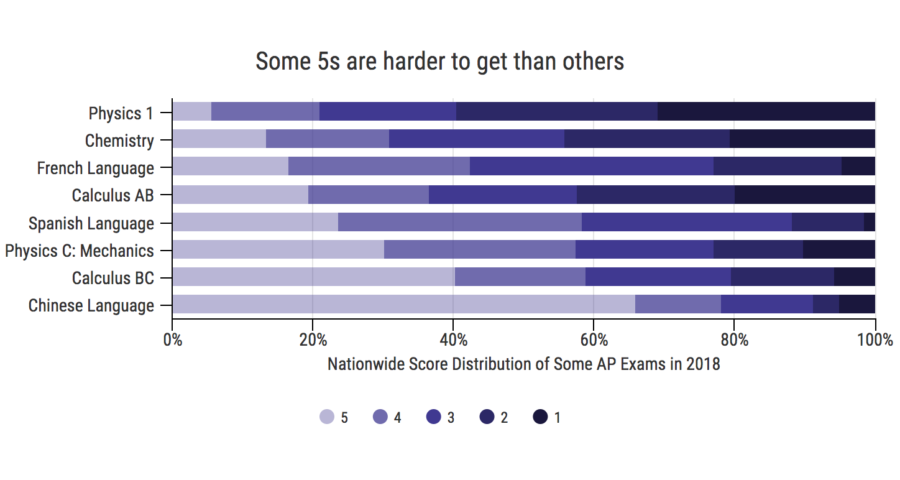Tensions rise between Urban’s teaching philosophy and the national popularity of AP testing
Score distributions of various AP tests nationally in 2018. Source: College Board. Infographic credit: Kian Nassre.
AP tests. The very phrase is uttered increasingly often due to their escalating role in the U.S. But while the Urban School of San Francisco may feel the pressure to conform to the increased presence of AP testing nationwide, it also feels the drive to preserve its depth-over-breadth teaching style.
Advanced Placement (AP) tests are typically taken at the end of an AP course. AP tests are administered by the College Board, and the course curriculum is purchased by schools from the College Board. Each test corresponds to a specific subject (sometimes to different difficulty levels) and is scored on a scale of one to five.
At Urban, there are no AP courses. Instead, there are Urban Advanced Studies (UAS) classes. According to Urban’s Director of College Counselling Lauren Gersick, UAS classes are of a comparable level of difficulty to AP course but are not tailored towards the tests. “UAS is faculty designed; it’s playing to the expertise of our very adept teachers. It allows more flexibility since we value depth over breadth and how to think instead of what to think. The core academic values of Urban are reflected in the way we teach,” Gersick said.
Urban School Science Department Chair Matthew Casey is versed in the differences between the AP tests and Urban’s UAS classes. “The APs teach a wide breadth of content that you memorize but don’t go deep into; you take the test then you forget it. Our courses are designed more thematically rather than rushing through all of it” Casey said. The Physics 1 and Physics 2 exams, for instance, each have a sampling of topics covered in the UAS physics course sequence. This difference in structure and order of content results in a disconnect between the Physics AP exams and the way that Urban students think about physics.
Furthermore, when it comes to physics, other sciences and indeed all APs, Urban’s curriculum does not sync up 100% with the AP courses. For instance, the Urban calculus curriculum matches up with the Calculus AB test rather well, but leaves out several topics in the Calculus BC test.

Rates of various AP tests at Urban over hte past five years. Source: College Counseling Office. Infographic Credit: Kian Nassre.
For Math, Science and Language, Urban has tutorial periods that run in the late winter and early spring trimesters to close the knowledge gap between the UAS courses and the full AP curriculum. This system is the successor to the six-week courses that Urban had a decade ago. Before they stopped due to philosophical and logistical reasons, these courses allowed Urban students to study for an AP course during one of their normal block classes, then switch into another class, such as Art as a Daily Practice, for the final six weeks.
According to Math Department Chair, Parisa Safa, the new T period system may be enough. “For the [Calculus] BC exam there is a lot more content … [the Tutorial prep] is going to move fast, so it’s a lot of work. We have had good results even though we … moved it into one hour a week instead of [four] … People at Urban who have done the work they should to prepare tend to succeed on the AP exam.”
While the number of students who take AP tests at Urban each year has remained in the 50s and 60s for the past five years, the popularity of individual tests had fluctuated. In this time period, the chemistry exam’s popularity at Urban fell by a half, while the English exam has quadrupled in interest. However, a constant is that AP test participation at Urban is low relative to the number of Urban students qualified to take an exam (ie, students taking UAS chemistry vs those taking the AP chemistry exam).
Nationally, by contrast, AP testing has skyrocketed in popularity. According to the National Center for Education Statistics and the College Board, from 2002 to 2018, the number of high school graduates per year increased by 24%, while the number of students who took AP tests increased by 211%. (This second statistic is inflated by the fact that an increasing but hard-to-pin-down number of students take AP tests in multiple years, but the rate of participation in APs still rose).
AP testing nationwide has morphed into several different meanings over the past few decades. “It used to be that you were proving that you had done college-level work in high school. That has evolved … A score of four or five could place you in higher level college classes or get you college credit in certain courses,” Gersick said.
However, the implications of AP tests are shifting on the college front. “I would put a large asterisk on [getting college credit from AP scores] because that has decreased by a large amount in frequency in the past few decades,” Gersick said. “Fewer colleges offer credits and more require perfect scores to get that credit. Public institutions like the UCs tend to be the most generous with those, which is a big part of why we still offer [AP tests] at Urban.”
Even though APs continue to be out of sync with Urban’s philosophy, Urban will continue to offer students the opportunity to take the AP tests. “I agree that we need to continue offering APs because if [an Urban student] can come in with some credits… it helps [them] take a couple of fewer classes that could prevent them from having to pay for another term in college,” Gersick said. “It allows them to move through college a little bit faster if they want to, because, as much as [college] is a developmental and fun time, it is a huge financial burden.”

Rate of AP testing nationally vs the rate of high school graduation. Source: National Center for Education Studies, College Board.


